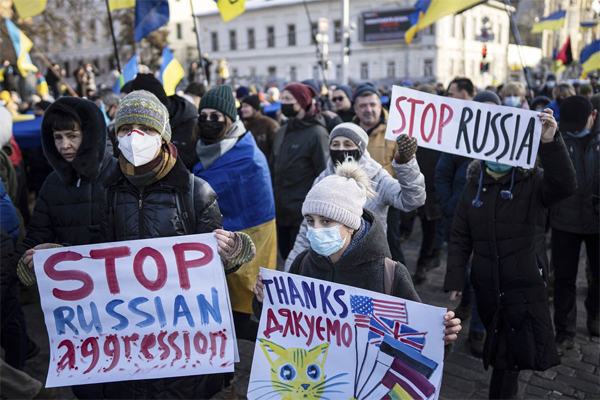
By Evelyn N. Farkas
The White House on Friday came out with its starkest warning yet on the threat facing Ukraine, saying Moscow could invade any day now. The national security adviser, Jake Sullivan, stressed there was no way to predict what President Vladimir Putin of Russia might do — but history shows we should not underestimate Mr. Putin’s willingness to violate another country’s sovereignty.
In late February 2014 Russian troops swept into Crimea, Ukraine. They seized government buildings and airports. With Ukrainian military units effectively boxed in, Russian reinforcements solidified Moscow’s control of the Crimean Peninsula by early March. There was nothing the Ukrainian military could do — years of corrupt management had left it ill equipped and unprepared. Attempts to retake Ukrainian bases and rescue their personnel would inevitably have led to a blood bath.
As the senior Pentagon official in charge of Russia and Ukraine, I was stunned by the invasion. I remember going to bed praying that the besieged Ukrainian naval, air and marine forces in Crimea would still be alive when I woke up. My colleagues in the White House Situation Room were equally horrified. Even if we had seen troop movements weeks or months in advance, we never would have imagined Mr. Putin would take such a risky and blatantly illegal action.
At the time, we debated how forcefully to confront Mr. Putin. In retrospect, we fell short. We, along with the administration that followed, ultimately appear to have emboldened Mr. Putin. That brought us to where we are today — with Mr. Putin amassing some 100,000 troops at the Ukrainian border, threatening to invade and redraw the global chessboard. To stop him, we must learn the lessons of Crimea and stand up to Russian aggression. The cost of failing to do that would be catastrophic.
Back in late 2013, my colleagues and I had been meeting almost daily after Ukrainians took to the streets to demand that their leader, President Viktor Yanukovych, take steps to bring Ukraine into the European Union. By late February 2014, more than 100 anti-Yanukovych demonstrators had been shot in cold blood. As the protests swelled and the government lost control of the situation, Mr. Yanukovych fled to Russia. While we were focused on that situation, Mr. Putin made his brazen move on Crimea days later.
This was the first time since World War II that one European country annexed part of another. The United States had to respond strongly. And we did — at first.

At the United Nations, we condemned the Russian annexation and the General Assembly declared the move illegal. Along with several other countries — including the members of the European Union, Canada, Japan and Australia — the United States imposed sanctions on individuals and entities supporting the annexation of Crimea.
Yet Mr. Putin kept going. By the spring of 2014, pro-Russian separatists had kicked off a bloody war in the Donbas region of eastern Ukraine. Responding to this Russian-led insurgency became the daily singular focus for the Obama administration’s Russia-Ukraine team.
As Russian-led forces took more Ukrainian territory, we organized another set of sanctions on Moscow as well as military assistance to Ukraine. These sustained efforts may have stopped Russia from taking more ground in 2015. Yet it was because of our focus on Donbas that the United States and the international community effectively set aside the Crimea situation and set the stage for the crisis today.
Of course, at the same time the administration was also struggling to wrap up the conflicts in Afghanistan and Iraq, manage the worsening civil war in Syria and trying to pivot attention to Asia. Crimea would get only intermittent official U.S. attention.
We took the international pressure off Mr. Putin’s revanchist violations of sovereignty in Ukraine — just as we had done in the aftermath of Russia’s invasion of another neighbor, the Republic of Georgia, in 2008. (Russia still occupies 20 percent of its territory.) Each time the United States did just enough to respond through sanctions and diplomacy aimed at containing the immediate transgression. But we failed to keep global pressure on the source of each crisis — Mr. Putin’s aggressive, illegal foreign policy.
This pattern continued in the Trump administration, and was even intensified by the president’s unseemly deference to Mr. Putin. Donald Trump downplayed Russia’s meddling in our elections and was willing to break U.S. law to withhold assistance to Ukraine, an action that led to his first impeachment by the House of Representatives. He also questioned the value of NATO, the alliance protecting eastern European states from Russian violations of their sovereignty.

The United States must not repeat that error. Now that an invasion appears imminent, the Biden administration must immediately treat Russia as a rogue state and aggressively isolate Moscow.
To be clear, I’m not suggesting that the United States and its allies send troops to push Russia out of Ukraine. But a diplomatic pressure campaign can help stop Moscow’s aggression. Yes, Russia is a nuclear power and Europe depends on its energy supplies, but the world should stop being intimidated into excusing Moscow’s actions.
What is at stake is more than Mr. Putin’s expansion of his sphere of influence. It’s about upholding the principles of the post-World War II order — and specifically a country’s right to its territorial integrity. If Mr. Putin is allowed to invade Ukraine again unscathed, then what’s to stop other authoritarian powers from doing the same elsewhere?
Ambassador Linda Thomas-Greenfield’s address at the United Nations last month that called out Russia’s aggressive actions was a good step and must be the beginning of a sustained strategy against Mr. Putin. Mr. Biden must rally an international coalition of the willing over weeks, months and years, if necessary to contain Russia’s threats, similar to the United States-led coalition that overturned Saddam Hussein’s illegal annexation of Kuwait.
Mr. Biden’s other moves — drafting strong economic sanctions, ramping up military assistance to Ukraine and the recent decision to send U.S. troops to reinforce NATO’s eastern flank — are strong and would benefit from concerted diplomacy at the United Nations.
To emphasize the pariah treatment, the Biden administration should, along with allies, expel Russia from international forums and impose export controls across all continents, as we do to confront Iran and North Korea.
To be sure, Russia’s deepened integration with Europe and the global financial system makes isolation difficult. But there are some avenues: The United States should work with European allies to put sanctions on Russian banks, even if it comes at a cost to our economic interests, as well as on financial institutions that service Russian sovereign debt. It could also cut Russia off from the SWIFT interbank messaging system.
And Washington must continue reducing Europe’s dependence on Russian energy by facilitating increased liquefied natural gas deliveries from the United States, Japan and elsewhere. Forcing Russia’s treasury to strain to meet domestic demands might be the only way to ramp up pressure on Mr. Putin from both the public and powerful oligarchs.
The United States has succeeded with similar campaigns: Pressure by Washington on big energy consumers helped to force Iran to enter into negotiations that ultimately led to the 2015 nuclear deal, for example.
Washington has been much more aggressive in exposing Russia’s various misinformation campaigns with this crisis — like citing intelligence about a Russian plan to create a pretext to justify invading Ukraine. But the Biden administration can and should do more.
Mr. Putin desires to be respected on the world stage. Further exposing Russia’s global meddling — including its support to authoritarian regimes in Eastern Europe, Latin America and Africa — will put Russia on the defensive. It also could prompt leaders accepting Russian support to pull back, fearful of public backlash jeopardizing their own holds on power.
The strategy won’t fully pay off overnight. But Mr. Putin has created an imperative for Mr. Biden to lead all nations in efforts to avert a war.
Evelyn N. Farkas (@EvelynNFarkas) was a deputy assistant secretary of defense for Russia, Ukraine and Eurasia in the Obama administration. She is also president of Farkas Global Strategies, an international business development firm. Energiesnet.com does not necessarily share these views.
Editor’s Note: This article was originally published by The New York Times, on February 11, 2022. All comments posted and published on EnergiesNet.com, do not reflect either for or against the opinion expressed in the comment as an endorsement of EnergiesNet.com or Petroleumworld.
Use Notice: This site contains copyrighted material the use of which has not always been specifically authorized by the copyright owner. We are making such material available in our efforts to advance understanding of issues of environmental and humanitarian significance. We believe this constitutes a ‘fair use’ of any such copyrighted material as provided for in section 107 of the US Copyright Law. In accordance with Title 17 U.S.C. Section 107. For more information go to: http://www.law.cornell.edu/uscode/17/107.shtml.
energiesnet.com 02 14 2022











